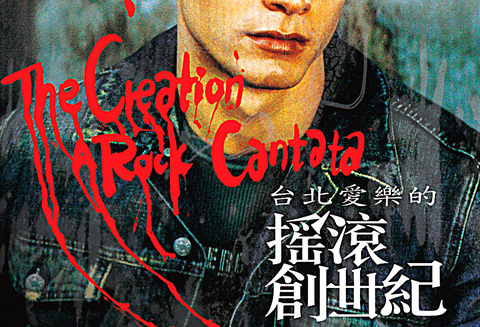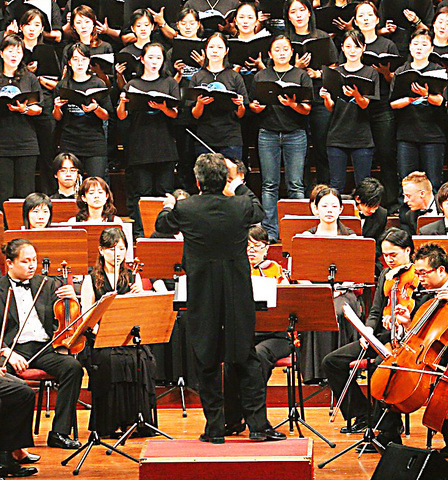With Christmas now only a couple of weeks away, the combined talents of the Taipei Philharmonic Chorus (台北愛樂合唱團), the Taipei Philharmonic Youth Orchestra (台北愛樂青年管弦樂團) and the Philharmonic Jazz Ensemble (台北愛樂附屬爵士樂團) will be adding a little classical-based rock 'n' roll for the festive season when they join forces to brings an adaptation of The Creation: A Rock Cantata (搖滾創世紀) to the stage of the National Concert Hall on Monday.
Organized by the Taipei Philharmonic Foundation for Culture and Education (
The popular Xmas cantata combines precise notation in tempi, with the less precise chord combinations of rock 'n' roll and popular music. Much of the improvisation is left up to the instrumentalists, which means that no two performances are identical.

The orchestra, chorus and jazz band will all be under the baton of celebrated local conductor Dirk Du Hei (杜黑). Du Hei, who received his Master of Music in conducting at the University of Illinois, has been actively involved in the promotion of choral and other musical activities in Taiwan since the early 1980s. He established the foundation in 1988 and in 1997 he was awarded the National Culture and Art Prize for his work.
The foundation has promoted many international cultural exchange programs and successfully staged numerous concerts and festivals including the Taipei International Choral Festival, the Taipei Philharmonic Summer Festival and the Taipei Philharmonic International Music Workshop.
Helping to give voice to Monday's festive concert will be local soprano Lin Tze-yin (

PHOTOS COURTESY OF THE TAIPEI PHILHARMONIC
The Taipei Philharmonic's adaptation of The Creation: A Rock Cantata will take place at the National Concert Hall on Monday, Dec. 5. Tickets cost from NT$300 to NT$1,500 and are available direct from the National Chiang Kai-shek Cultural Center's box office. The performance begins at 7:30pm.

When Taiwan was battered by storms this summer, the only crumb of comfort I could take was knowing that some advice I’d drafted several weeks earlier had been correct. Regarding the Southern Cross-Island Highway (南橫公路), a spectacular high-elevation route connecting Taiwan’s southwest with the country’s southeast, I’d written: “The precarious existence of this road cannot be overstated; those hoping to drive or ride all the way across should have a backup plan.” As this article was going to press, the middle section of the highway, between Meishankou (梅山口) in Kaohsiung and Siangyang (向陽) in Taitung County, was still closed to outsiders

President William Lai (賴清德) has championed Taiwan as an “AI Island” — an artificial intelligence (AI) hub powering the global tech economy. But without major shifts in talent, funding and strategic direction, this vision risks becoming a static fortress: indispensable, yet immobile and vulnerable. It’s time to reframe Taiwan’s ambition. Time to move from a resource-rich AI island to an AI Armada. Why change metaphors? Because choosing the right metaphor shapes both understanding and strategy. The “AI Island” frames our national ambition as a static fortress that, while valuable, is still vulnerable and reactive. Shifting our metaphor to an “AI Armada”

US President Donald Trump may have hoped for an impromptu talk with his old friend Kim Jong-un during a recent trip to Asia, but analysts say the increasingly emboldened North Korean despot had few good reasons to join the photo-op. Trump sent repeated overtures to Kim during his barnstorming tour of Asia, saying he was “100 percent” open to a meeting and even bucking decades of US policy by conceding that North Korea was “sort of a nuclear power.” But Pyongyang kept mum on the invitation, instead firing off missiles and sending its foreign minister to Russia and Belarus, with whom it

The Chinese Communist Party (CCP) has a dystopian, radical and dangerous conception of itself. Few are aware of this very fundamental difference between how they view power and how the rest of the world does. Even those of us who have lived in China sometimes fall back into the trap of viewing it through the lens of the power relationships common throughout the rest of the world, instead of understanding the CCP as it conceives of itself. Broadly speaking, the concepts of the people, race, culture, civilization, nation, government and religion are separate, though often overlapping and intertwined. A government